

 |
 |
The 72nd All-Western Championships
Part I: the Qualifying rounds
Every Labor Day weekend, the best players in the far west get together at the
Santa Clara Hyatt, in order to beat heads against one another in the ACBL Western
Conference's premier event — a four-session pair game featuring
two qualifying sessions and a two-session final. It is a feather in
one's cap to score at all well in this event.
Despite the overall quality of the field, there always are a few oddball pairs
entered — at least on the first day — who have elected to
try their luck against strong competition; their results are unpredictable.
Even the better players can achieve some silly results while trying for the maximum
score. I would share with you some hands that passed by my table —
both good and bad. (As always, a board might be rotated for convenience.)

BAD BID: Board 11, first qualifying session
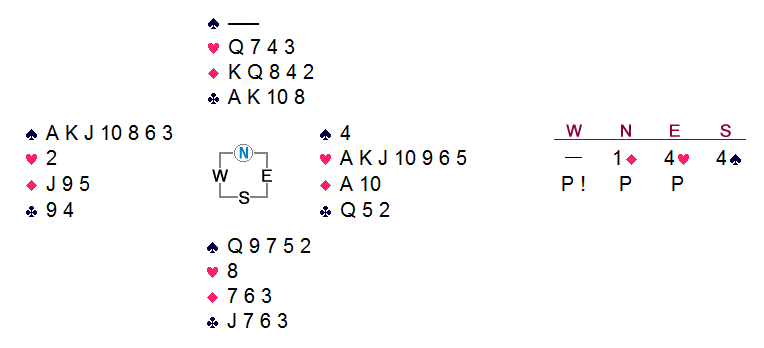
South was in outer space on this one. Apparently he was gambling that
his partner had some spades, which might provide a cheap sacrifice against
4♥ Sitting west, I had no reason to think that
partner's hand was so strong; for all I knew, the opponents could make game or
even slam in a minor, so I quietly passed. North was in a quandary as well;
for all he knew, his partner was looking at my hand, in which case
4♠ would have had a reasonable play.
The result: Down six. North-South -300, when best defense would have defeated 4 hearts by two tricks.

GOOD PLAY: Board 19, second qualifying session
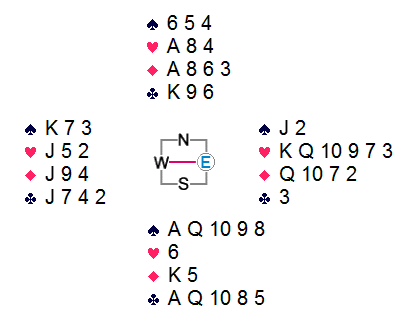
South played in 4♠ after east had overcalled in hearts. Winning the opening lead with the heart ace, he finessed the ten of spades. West grabbed her king to lead another heart. Ruffing in hand, the ace of trumps was cashed, dropping east's jack.
Now came the key play. Declarer switched to clubs — low to dummy's
king, then low to the ace. Had that suit split 3-2, partner would
then have drawn the last trump and claimed. As it was, he cashed his other
high club, then ruffed the fourth round in dummy as west followed helplessly.
Returning to hand with a heart ruff, south drew the outstanding trump and claimed
his twelve tricks.
Partner's foresight earned him 35 of 38 match points on the board. Although this was not a difficult maneuver, the field apparently couldn't find the textbook safety play. Nor was this the last time I would see an ostensibly good player fail to apply an elementary declarer strategy to his advantage.

BAD BID: Board 6, second qualifying session
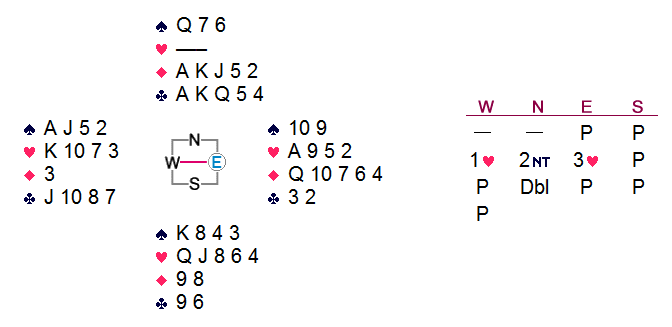
We all know that third-hand sometimes opens light; but many players fail to
appreciate why. Yes, partner might passed originally with a near-opener;
but that's no reason to go crazy. After two passes, one still should strive to
have a real reason to bid — either something approaching opening count
or at least a decent source of tricks. Today's west player had neither.
North's plan was to show the minors immediately, then, over partner's
minor-suit preference, to complete a perfect description with
3♠. East, however, properly felt it her duty to
compete to the 3-level on her side's 'known' nine-card
fit. Partner knew what to do with my reopening double.
The result: Down two. East-West -500 against a
part-score.

GOOD DEFENSE: Board 31, second qualifying session
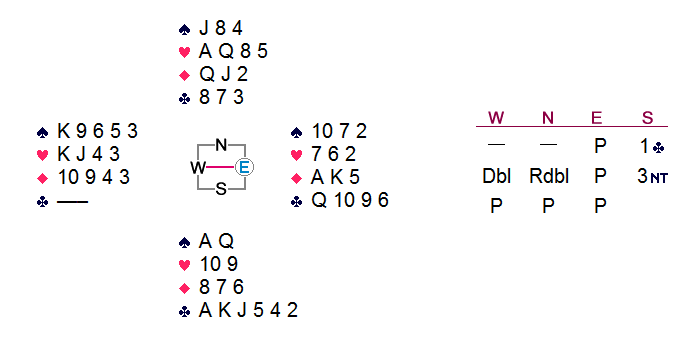
Notice that I, as east, eschewed the 'automatic' call of
1NT over RHO's redouble, which could have proven disastrous
had the doubling started. Partner was known to be weak, and in any case
I have seen his takeout doubles before.
The key play of the hand was the opening lead of a low diamond. It so happens that the only way to make the contract is to play low from dummy immediately! Declarer being a mere mortal, however, he called for the queen, won by east's king. A spade switch was taken by south's ace as west contributed an encouraging card. Declarer cashed the ace of clubs, getting the bad news, then continued with a low club to my nine-spot.
I briefly considered cashing out with diamond ace and the spade king (if partner held it), but no; declarer could not have as many as three hearts on the bidding, so declarer could not generate the ten winners required to squeeze partner in the majors. I continued with a spade to west's king and, of course, he now placed the diamond ten upon the table. Declarer was down one for sure at this juncture, but he still was looking for something resembling a vulnerable takeout double in partner's hand; so he went up with dummy's jack, and our side took three more diamond tricks.
Result: Down two. East-West +100 and all the matchpoints.

BAD DEFENSE: Board 14, second qualifying session
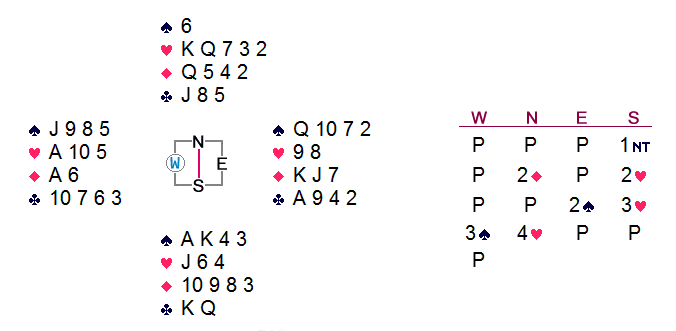
My fourth-position 1NT opening was 12-14 HCP. Judging our
defensive prospects to be nil, I competed to 3♥. Also
judging our defense against 3♠ to be neglible, north competed
to 4♥ as a good sacrifice, or even a possible make!
This is not as crazy a notion as it may look; swap south's ♠AK
for the ♦AK, and game is there.
I won the spade opening lead with the ace, then played a heart to the king and a heart to the jack and ace. West continued spades, ruffed in dummy. I drew the last trump, played a club to the queen, and ran the ten of diamonds to east's jack.
This is where things started to unravel. East returned the king of diamonds, crashing his partner's ace! West persisted with spades; I discarded a club from dummy and won the king. The nine of diamonds was led to dummy's queen, then the last trump was played off, south dumping his club king. On this trick, west apparently felt it important to hold onto his doubleton ten of clubs, so he ditched his remaining spade!
Now, at trick twelve, dummy's five of diamonds was led. Apparently, even after the crashing of honors, east still was unable to count the diamonds. Thinking that dummy would win the twelfth trick (he admitted as much in the postmortem), he parted with his spade queen. So I was able to claim the last two tricks with the diamond eight and the spade three!
Result: Making four. North-South +420 and an uncontested top.

GOOD BID: Board 9, second qualifying session
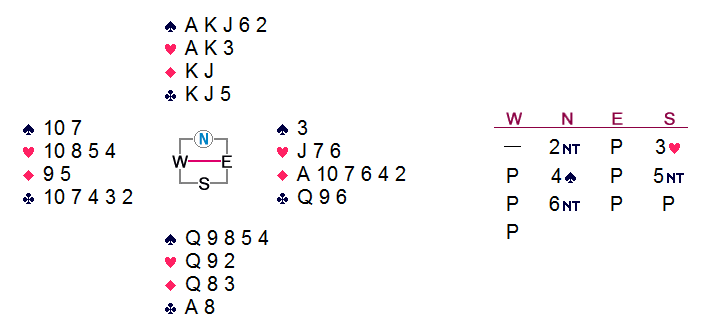
North's opening bid showed 22-24 HCP in our methods. After partner's
transfer to spades, I could not help but get our side to game. Partner's
5NT meant simply, "pick a slam". Knowing that the
spades were running, my hand had become even better, so it was fairly easy to venture
the maximal contract. Good planning by partner!

These and other fine results enabled my partner and me to sit in
third place overall after the first day. See Part II for the
thrilling finale of this event — where the hands were even better,
yet our own scores were not.